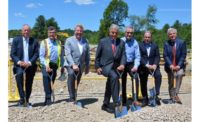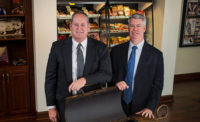Processing Paradigm
By Barbara Young, Editor-In-Chief
Advance Foods Company turned its manufacturing facility, once a bicycle factory, into a progressive shop for producing innovative meat and poultry products.
Advance Food Company’s 150,000-square-foot meat and poultry processing plant in Enid, OK, known as the 54th street facility, is a metamorphic structure initially built as a bicycle factory. The plant’s evolution mirrors the business style and stamina of owners — Paul Allen and Dave McLaughlin — who identified its meat-processing potential in the early 1990s.
The 54th Street building languished empty in abandonment until the city of Enid, its owner of record, allowed the partners to rescue it for the production of fully cooked beef, pork, and poultry products. Originally conceptualized with only two lines, the plant now has six production lines in place, five of which are dedicated to “value-added” RTE (ready-to-eat) products.
Having been actively engaged in meat-product production since 1973, the co-founders of Advance Food Company could easily spot a worthy facility. The two men began their business enterprise with eight employees and $300,000 in annual sales. Today, the family business — a family-owned-and-operated company — comprises five plants in Iowa, Oklahoma, Pennsylvania, and Tennessee, operating with more than 1,300 combined employees, and generating more than $400 million in annual sales. Advance Food Company manufactures processed meat products for sales to foodservice distributors throughout the United States, Mexico, and Canada. Specializing in pre-portioned beef, pork, veal, chicken, and turkey products, the company offers raw-breaded and fully cooked versions of each. Popular products include a comprehensive line of country-fried steaks, breakaway Philly steak sandwich meat, and boil-in-bag Kitchen Sensations meals such as pot roast and beef stroganoff.
In addition to the more than 45-million pounds of meat products it produces for foodservice, Advance Food Company co-packs retail product for Advance Brands LLC (see “Fast Fixin’ Fanatics”). Advance Brands is a joint venture of Advance Food Company and Excel Corporation, now part of Wichita, KS-based Cargill Meat Solutions. Although Orange City, IA, is the production home for Advance Brands’ Fast Fixin’ products, the 54th Street facility in Enid annually produces more than 20-million pounds of fully cooked chicken nuggets, strips, beef meatballs, country-fried steaks, and cheeseburger fingers.
The plant operates with 500 associates and two production shifts supported by a third sanitation shift. Identifying the fine points of the 54th Street facility in a recent tour, Rick Loehr, plant manager, discusses processing capacity and production diversification, among other initiatives related to food safety and research and development. Of significant note, he explains, is the plant’s operating approach to food-safety and product-quality matters.
“We have developed production attributes on all our products with help from our R&D team,” Loehr explains. “They give quality monitors and coaches a photographic and written guideline allowing them to meet the expectations of our customers and sales force. It helps our associates know how products should look, smell, and taste.”
To this end, the plant operates under a food-safety and systems-integrity program structured to separate food-safety concerns from product-quality matters.
Since the beginning, an enclosed observation “catwalk” deck has been used for viewing production in self-contained areas below. The formulation and conversion area handles fresh-and-frozen raw material grinding, metal detecting, and the forming machine step for creating various product shapes. Another area is dedicated to raw-breaded production. Product cooking steps include browning and setting in fryers followed by final cooking in ovens.
“One of the critical control points relates to cooking product to the proper temperature,” Loehr emphasizes. “Every day on every production line, there are specific standard operation procedures taken to meet and exceed USDA regulations.”
For example, product coming out of fryers is analyzed every 15 minutes to ensure internal temperature reaches the required critical control point. Meanwhile, incoming ingredients and products are tested throughout production for quality and consistency. Thanks to an extensive computer product traceability system, palletized product carries information for real-time inventory and tracking from raw material to final distribution.
Under the restructured operating system, the food-safety team strategically supports all departments within the company in ensuring compliance of food safety and USDA regulatory requirements. Meanwhile, team members responsible for meeting the product-quality standards set for each individual item work on assuring customer satisfaction.
“This process allows us to continuously improve our systems that support food safety, finished product quality, and the needs of our customers,” Loehr says. “Our success is directly associated with team member involvement.”
Progressive processing
A 31,000-square-foot addition at the meat-processing home of Advance Brands LLC in Orange City, IA, marks the second major facility upgrade in the nearly four years of its operating life.
Headquartered in Oklahoma City, OK, Advance Brands is a joint venture between Advance Food Company, Enid, OK, and Wichita, KS-based Cargill Meat Solutions.
The $18-million expansion in Orange City enhances the plant’s state-of-the-art manufacturing capabilities with a “mega” line increasing annual production at the facility by 45-million pounds of fully cooked meat products. The addition will require 120 additional employees, increasing the current Advance Brands’ roster of nearly 500 team members.
“This expansion is an investment in Advance Brands, along with our Orange City community and the state of Iowa,” reports Tom Harpenau, Advance Brands president. “We have a tremendous team of employees at the plant and we look forward to offering them broader growth potential while bringing new jobs to the area.”
The expansion is scheduled for completion mid-summer of 2005.
The Orange City plant — producing up to 250,000 pounds of fully cooked beef, pork, and poultry product daily on two shifts — is designed with food safety in mind, beginning with sanitized footbaths to employee personal protective attire. To prevent cross-contamination, smocks in different colors identify assignment areas in the plant — white for raw product, light blue for partially cooked, and navy for the fully cooked area.
Workers also must “belly up” with an apron that keeps smocks away from conveyors.
Production begins with whole-muscle poultry, pork, and beef chunks stored in the receiving cooler at 26°F to 28°F. Once the meat is checked in and weighed, it receives an identifying bar code enabling it to be tracked from the raw-receiving site to customers as a finished product.
The formulation and blending room is the first phase of production. A fat analysis is conducted before the blended mixture undergoes the final grinding and on to the forming stage. The shaped product is scored to produce tiny holes for efficient batter penetration. A vibratory fryer system sets the breading on the nuggets to prepare them to even cooking in the oven. A direct contact grill makes the patties look as if cooked in a stovetop fry pan.
A custom-built laner flow system collates patties, which are fed into an innovative stacker that accurately positions product to be overwrapped and boxed. Pre-priced stickers or coupons are attached to packaged product at the plant. A dual-labeling system allows for top and bottom sticker attachment.


Report Abusive Comment